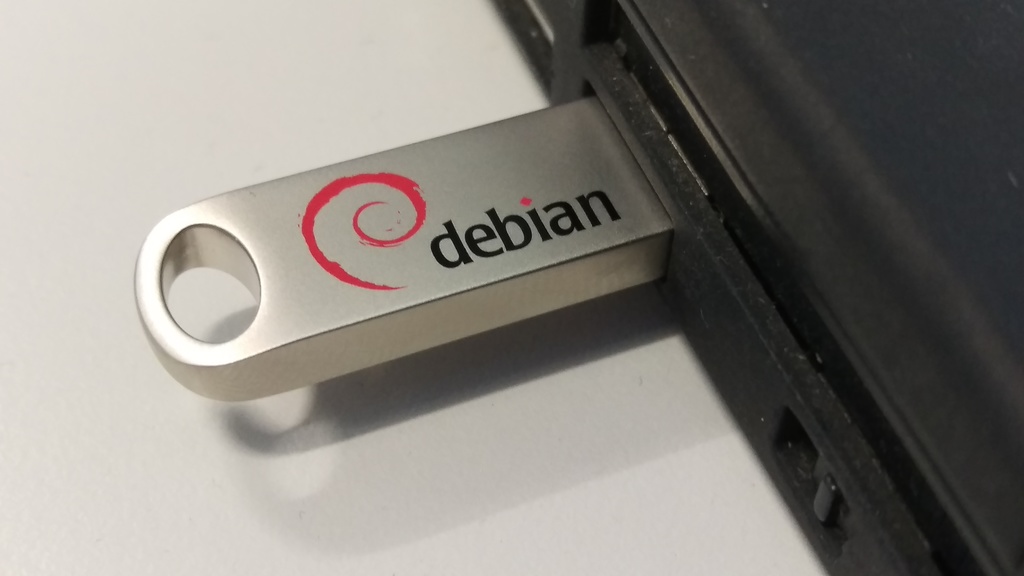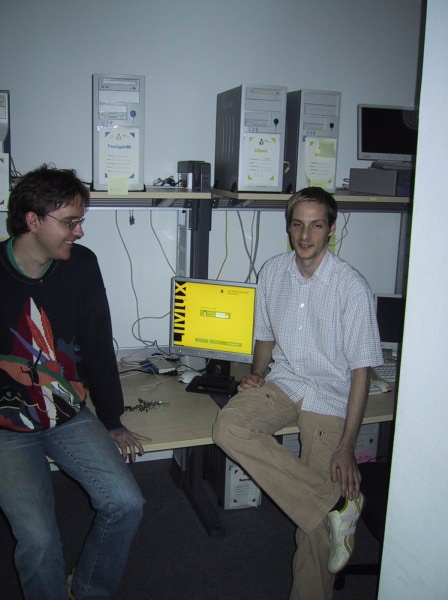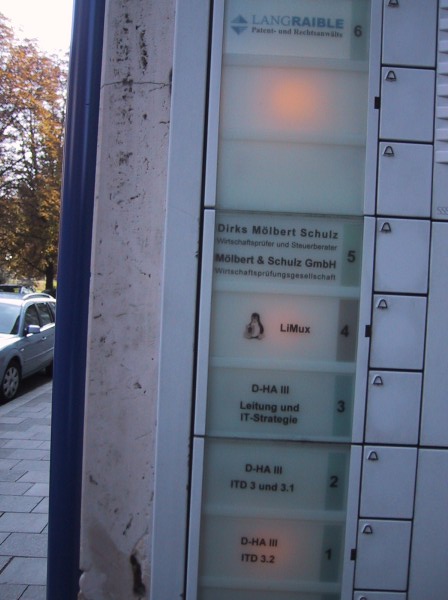 About
About
Steve's blog,
The Words of the Sledge
steve@einval.com
Subscribe
Subscribe to the RSS feed.
Links
Friends
Thursday, 04 June 2020
What can you preseed when installing Debian?
Preseeding is a very useful way of installing and pre-configuring a Debian system in one go. You simply supply lots of the settings that your new system will need up front, in a preseed file. The installer will use those settings instead of asking questions, and it will also pass on any extra settings via the debconf database so that any further package setup will use them.
There is documentation about how to do this in the Debian wiki at https://wiki.debian.org/DebianInstaller/Preseed, and an example preseed file for our current stable release (Debian 10, "buster") in the release notes.
One complaint I've heard is that it can be difficult to work out exactly the right data to use in a preseed file, as the format is not the easiest to work with by hand. It's also difficult to find exactly what settings can be changed in a preseed.
So, I've written a script to parse all the debconf templates in each release in the Debian archive and dump all the possible settings in each. I've put the results up online at my debian-preseed site in case it's useful. The data will be updated daily as needed to make sure it's current.
Updated June 2020 - changed the URL for the preseed site now I have a domain set up at https://preseed.debian.net/.
17:53 :: # :: /debian/misc :: 2 comments
Thursday, 11 June 2015I've had some 8GB USB keys made, with the Debian swirl and text. By buying a reasonable number, I've got what I think is a good price for nice high-quality keys (metal body with a solid loop for attaching to a keyring). I'm now selling these for 7 pounds each, and I'm planning on bringing some to DebConf 15 too, where they'll be 10 EUR.
They're selling faster than I expected - if you're interested in buying one (or several!), please let me know. If there's enough demand, I may order more.
12:32 :: # :: /debian/misc :: 1 comment
Wednesday, 16 February 2011Saw Daniel's announcement about Progress Linux today. Best of luck with the project - it's great to see more and more Debian derivatives, each focussing on the bits that they care about most.
23:52 :: # :: /debian/misc :: 2 comments
Friday, 12 November 2010(Mainly for my own information, so I can find this again later!)
I'm running Debian Squeeze on my Lenovo Thinkpad X200 laptop, using the amd64 version so that I can make the most of the 64-bit CPU. However, I also need a range of 32-bit apps too for now, typically proprietary rubbish like the Flash plug-in for Firefox^WIceweasel. So I set up a 32-bit chroot with a small Debian installation in there too. (Roll on multi-arch!) That's been working ok for a while, except that I couldn't get working audio in my browser. I didn't really pay much attention to that until recently: I wanted to watch some videos on YouTube and the sound mattered!
After some digging, it became clear that Iceweasel inside the chroot just wasn't talking to the currently-running pulseaudio server outside the chroot. I had installed all the required libs in the chroot too, but still no joy. After some searching (thanks to the folks on the Archlinux wiki for this!) I've now been able to configure my chroot correctly. 2 bits needed:
1. Configure alsa in the chroot to use pulse by default by creating/editing /etc/asound.conf:
pcm.pulse {
type pulse
}
ctl.pulse {
type pulse
}
pcm.!default {
type pulse
}
ctl.!default {
type pulse
}
2. The dbus machine ID in the chroot needs to be the same as that of the main host, which it wasn't for me. That caused audio apps to report "connection refused" when I tested them. The machine ID is stored in /var/lib/dbus/machine-id. Either copy that file from the host system into the chroot, or add /var/lib/dbus as a bind-mount along with the usual suspects like /home and /tmp.
Job done, I can watch movie trailers etc. with sound in my browser. Yay! :-)
17:46 :: # :: /debian/misc :: 5 comments
Wednesday, 08 September 2010Welcome back to the Debian clan, Lars \o/.
11:13 :: # :: /debian/misc :: 0 comments
Tuesday, 17 August 2010Happy birthday Debian!
Thanks to all my fellow Debian contributors for all your work on making the best OS there is. And especially thanks to the people who worked on the birthday surprise for us all yesterday - excellent work!
During the couple of years I was DPL, I received messages of thanks on behalf of the project many many times, whether by email or in person. I was happy to accept and pass on a lot of those messages, as I know they mean a lot to people working hard in a volunteer project. Now due to thanks.debian.net, there'a an easier way for people to voice their gratitude directly to the individual people and teams that are working on Debian. Awesome! Although it'd also be nice if we could have the wiki back without balloons now we're after the 16th... *grin*
Reminder: if you'd like to share in the birthday celebrations (and the beer!), there's still time to come along to the Debian BBQ I'm hosting at the end of the month in Cambridge, UK. See the OMGWTFBBQ wiki page for more details.
11:28 :: # :: /debian/misc :: 1 comment
Sunday, 18 July 2010I wrote a while back about the "fun" Jo and I were having with her Acer Aspire One 751 netbook, a machine that was "blessed" with Intel's integrated GMA500 graphics. It was a PITA to set the machine up and the final installation of Ubuntu Jaunty was anything but reliable, locking up frequently.
Well, there's more to the story. In the comments on that blog entry, Ben Armstrong pointed me at some very useful information from the Debian EeePC team: http://wiki.debian.org/DebianEeePC/Model/1101HA, specifically notes on how to use grub2 and the fbdev X driver to get native resolution on a 1366x768 screen. A couple of weeks back I finally managed to steal the laptop from Jo for a few minutes and try that setup. The results are very promising - X performance is perfectly acceptable and the X lockups have totally gone away. So (shock!) it looks like the crappy binary drivers were to blame.
Jo is over the moon that finally her Linux laptop is happy and she has specifically asked me to blog again and thank Ben for his help. Thanks! I'm also hoping that this post will help other people searching for useful information on this nasty hardware and how to make it work as well as possible.
21:22 :: # :: /debian/misc :: 2 comments
Monday, 07 June 2010
Also sad about the Poulsbong^H^H
Apropos Matthew's post...
I picked up a cheap netbook for Jo a couple of months ago, an Acer Aspire One 751. She liked the look and feel of the machine, and it was much smaller and more carryable than the massive old Dell "slab" she'd been using previously. Got a very good deal on it too, as it was the last one in stock at the local Comet store.
All went well until we got it home and I started playing with it. That was when I found the painful truth: it was based on the Poulsbo, using Intel's crippled GMA500 graphics chipset. Up until then, I'd been very happy with buying Intel kit: for the last few years it's been a sure sign that the hardware would work well with Debian and Linux. Now they've come out with a crappy product that has destroyed that goodwill. I spent many hours working through various options to try and get this new netbook up and running properly using Debian, but to no avail - the various binary blobs wanted newer versions of code than was in Lenny and (by then) older stuff than was available in Squeeze. In the end I gave up and installed an outdated version of Ubuntu on the machine just so Jo could have it working for her when we went on holiday together.
Since then, she's had to get used to the machine locking up once or twice a day while she's using it (something I can only assume is caused by the shitty drivers). She's happy enough in that it's much better than her old Vista-infested Dell machine, but it's really not a great experience for her compared to the Thinkpads she sees others using reliably and flawlessly at home.
At some point I guess we'll simply ditch the machine altogether and get something less nasty. Thanks for the good stuff you used to make, Intel, but you've lost your way. I'll be damned careful next time to avoid this trap.
18:33 :: # :: /debian/misc :: 10 comments
Friday, 23 April 2010When you're calculating checksums, be careful that you use the correct version of the result. Don't use the version printed in hex when you actually need the binary version in your binary format. Doh!
01:06 :: # :: /debian/misc :: 0 comments
Monday, 22 June 200921:17 :: # :: /debian/misc :: 0 comments
Sunday, 10 May 2009I've followed the advice of Daniel and generated myself a new PGP key. I've moved from an old 1024-bit DSA key (88C7C1F7) to a new 4096-bit RSA key. I've signed the new key with the old one so there is a trust path already, and I've uploaded it to the keyservers today. I'm expecting some DD signatures on it shortly after a trip to the pub tonight. Once the new key is accepted I'll start phasing out the old one, of course. New key details:
pub 4096R/3442684E 2009-05-09
Key fingerprint = CEBB 5230 1D61 7E91 0390 FE16 5879 7957 3442 684E
uid Steve McIntyre <steve@einval.com>
uid Steve McIntyre <stevem@chiark.greenend.org.uk>
uid Steve McIntyre <93sam@debian.org>
sub 4096R/E2C26E29 2009-05-09
00:55 :: # :: /debian/misc :: 0 comments
Thursday, 11 September 2008I posted a couple of weeks back to say that I'd got the Debconf plague again this year. Unfortunately, it looks like I picked up something worse than just the normal cold/'flu. I've been on penicillin for a week to try and clear up a throat infection, but it's not gone yet. Time for blood tests to see if I've got anything worse. I've been too ill to go to work several times in the last couple of weeks, feeling totally exhausted and feverish. Here's hoping that things start clearing up soon...
Again, if I've not responded to you about Debian stuff lately then please pester/remind me as necessary and I'll try to get back to you.
00:55 :: # :: /debian/misc :: 2 comments
Saturday, 30 August 2008Sorry, ever since Debconf I've been busy, ill and otherwise distracted. I'm still catching up... Stuff that's happened:
Dude, you're married! For the second year running, I had to leave Debconf a day early to attend a wedding party. My good friend Matthew married Oxana last Monday. I've just put my photos of the happy event online today.
After a successful Debconf where I managed to evade the normal plague, it hit hard on the Tuesday morning and I've been struggling with it ever since. Just about over it now, but I've been feeling crap for over a week.
On the way to Buenos Aires to catch my flight back to England, I received a text message telling me the sad news that my uncle, John Bolton had passed away. This means that the eldest two of my mum's three brothers have died this year, in the space of just a few months, and it's been a very hard time for the family. The funeral happened earlier this week, so I was away and mostly off-line for a couple of days travelling there and back.
I'm trying to get back up to speed on a whole host of different things at the moment; if you're waiting on a response from me about Debian-related stuff, please feel free to prod me via email or IRC.
23:50 :: # :: /debian/misc :: 0 comments
Sunday, 10 February 2008
Using autofs for GPG keys on a USB stick
A few people have asked me how I use GPG with a USB stick. I've written up a small howto for them, but it's probably worth sharing with a wider audience.
21:17 :: # :: /debian/misc :: 0 comments
Monday, 01 October 2007
Debian T-shirts popping up everywhere...!
Phil and I managed to catch up with Linus when he was at the kernel summit in Cambridge last month. We gave him a Debian T-shirt at the time, as Phil blogged at the time.
Barton George was one of a number of Sun people who came along to Debconf, and he picked up an Etch T-shirt while he was there too. Apparently he's quite keen to wear it in public too... :-)
Any more action shots out there?
22:21 :: # :: /debian/misc :: 1 comment
Thursday, 09 August 2007It seems that MJ Ray can't help but wantonly misinterpret other people's words. He posted about my question to debian-project (which is fair enough), but in his own inimitable style blatantly missed the point, presumably to cause offence. I'm not suggesting banning non-Debian posts from Planet Debian at all; what I'm suggesting is removing feeds that have zero content relevant to Debian, and I started a discussion to ask for other people's opinions. Spot the difference?
Mark, this kind of snide, troll-like posting is exactly the reason why people "inexplicably dislike" you. If you can't understand that, well...
14:17 :: # :: /debian/misc :: 0 comments
Sunday, 21 January 2007That's a question I've been asked (by myself and others) lots of times over the years I've been involved. Especially over the last few months while I've been wandering around Europe on the BSP and party trail, I've also been asking other people to explain their motivations too. For myself, I must admit that I'm selfish:
- I want to have a good free operating system for me to use, and Debian certainly fits that need.
- I'm a bit of a control freak - to make sure that the OS matches what I need, I want to be able to contribute and help direct how things are done. Again, Debian fits that for me.
- I want to be able to trust the OS and the people working on it. Debian certainly meets that - I've met large numbers of DDs now, and almost without fail they're competent, friendly people who are good to work with and (probably just as importantly to me) good to meet up with and socialise with.
- I like stability too. There's a very large selection of software available for me to use, yet I can just install stable on my servers without having to worry personally about the security of all the random packages I may install. I can also rely on new stable releases coming along from time to time, with good support for upgrades and plenty of support for older releases so I can safely upgrade without surprises.
Obviously, there's also the fun of hacking on a variety of Free software programs. But that's something I could do on my own, or within a multitude of projects out there. But in very few of those would I be able to materially affect how I use my own computers every day.
So, my question for the other Debian people: what gets you working on Debian?
22:25 :: # :: /debian/misc :: 4 comments
Tuesday, 14 November 2006Steinar suggests that he doesn't like cdbs. He's not alone. cdbs may make life easy for the maintainer, but it can make it incredibly difficult for anybody trying to fix bugs and NMU a package. I've found this myself when doing RC bugfixes during the recent round of BSPs; I must admit that more than once I've started looking into a bug only to give up the moment I've seen it uses cdbs.
Fixing packaging errors is much harder when all the details of the package build are hidden from you in a mass of variables and included Makefiles. Unfortunately, it seems quite a number of new inexperienced maintainers have been using cdbs with very little understanding of the magic it does behind the scenes. This doesn't bode well for the quality of their packages in my experience.
17:58 :: # :: /debian/misc :: 2 comments
Tuesday, 31 October 2006At the Google Summer of Code Mentors Summit earlier this month, a couple of Subversion developers gave a presentation called "How to Protect Your Open Source Project From Poisonous People"; the slides are available online. A lot of their points are well-observed and well worth thinking about.
20:16 :: # :: /debian/misc :: 0 comments
Wednesday, 18 October 2006
LiMux - bringing Debian to Munich's local government
As promised yesterday in my report about the Munich BSP, I'd like to talk some more about LiMux, the project being run within the City of Munich to replace all of their desktop Windows systems with Linux. The team kindly offered us the use of their offices in central Munich as a base for the BSP last weekend, and on Sunday afternoon they gave us a demonstration and answered lots of our questions. The following is from my (known-faulty) memory...
Jan-Marek and Florian talked us through their setup. They're using FAI to automate installation of systems, along with LDAP to store lots of configuration information and GOsa as a user-friendly front-end to that configuration. They've integrated these to enable some very clever management features so that all aspects of the city-wide system can be maintained from one central point. As new machines are introduced onto the network, they can be configured into one class or another: simple desktop clients up to so-called "depot" servers, used as seeds for further clients. Individual user profiles can be tweaked, giving users access to new applications as they are needed. Shared resources like network storage and printers are set up automatically from the LDAP database. Access to USB storage devices can be controlled on a per-device, per-user basis for security.
That's quite an impressive feature list. Most of the work has been in configuration and systems work rather than custom packages on the clients themselves - the vast majority of the packages installed come straight from the standard Debian archive, with some backports (like a newer version of KDE). Building on top of standard packages means that they have access to a huge amount of Free Software without having to do all of the work themselves. A small team (10-ish at the moment, growing to 100 or so in the future) can effectively deploy and manage desktops and associated servers for a huge number of users - they're expecting to be supporting on the order of 30,000 systems 2 years from now.
The team have just recently made their first stable release and are starting to roll it out across the city, one department at a time. There are the familiar issues involved in the deployment, of course. For example, users don't want to help test pre-release versions to help nail bugs, but then complain loudly when they find bugs in the first release. And in such a large project to migrate from predominantly Windows (NT4!) desktops to KDE on Linux, a major part of the effort needed is in user training. There is quite a bit of support and custom work needed to convert people's MS Office macros over to working on top of OpenOffice. And there are still quite a number of users who will remain using Windows for specific applications that still don't have Linux equivalents yet. Apparently the "Wine Cellar" group will help on that front. *grin*
In terms of collaborating with Debian, the LiMux team are expecting to help in a few ways. As bug reports are filed against their applications (apparently very few so far), they'll be pushed upstream along with (hopefully) fixes for them. They will also be devoting some full-time developer effort to security work; it would be good for both sides if this effort can be shared.
It was quite striking to see Tux, the Linux penguin, as a visible logo in local government offices! The team have clearly made some excellent progress on this exciting project, and I'm sure that I can speak for all of Debian in wishing them the best of luck in the future. I'll be watching with interest...
02:05 :: # :: /debian/misc :: 16 comments



